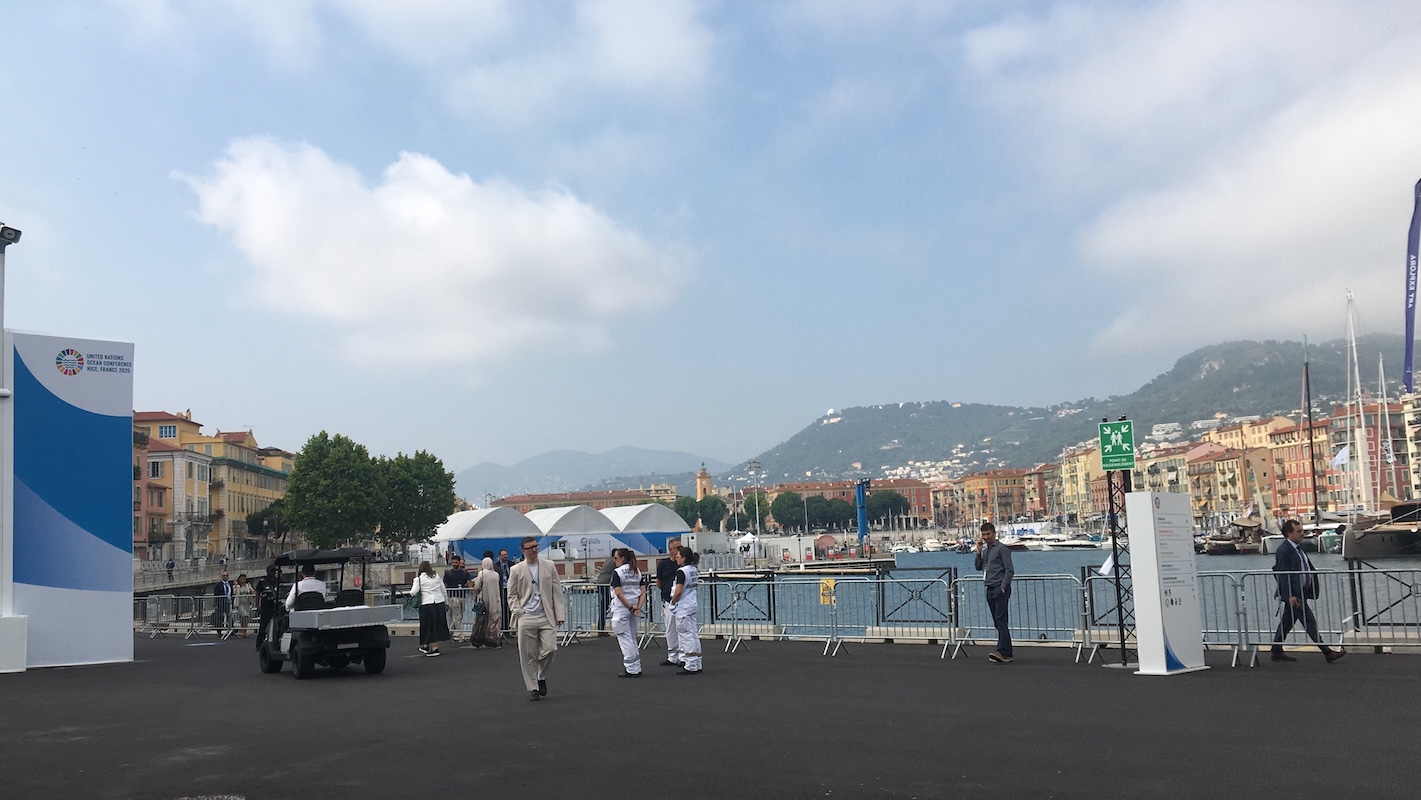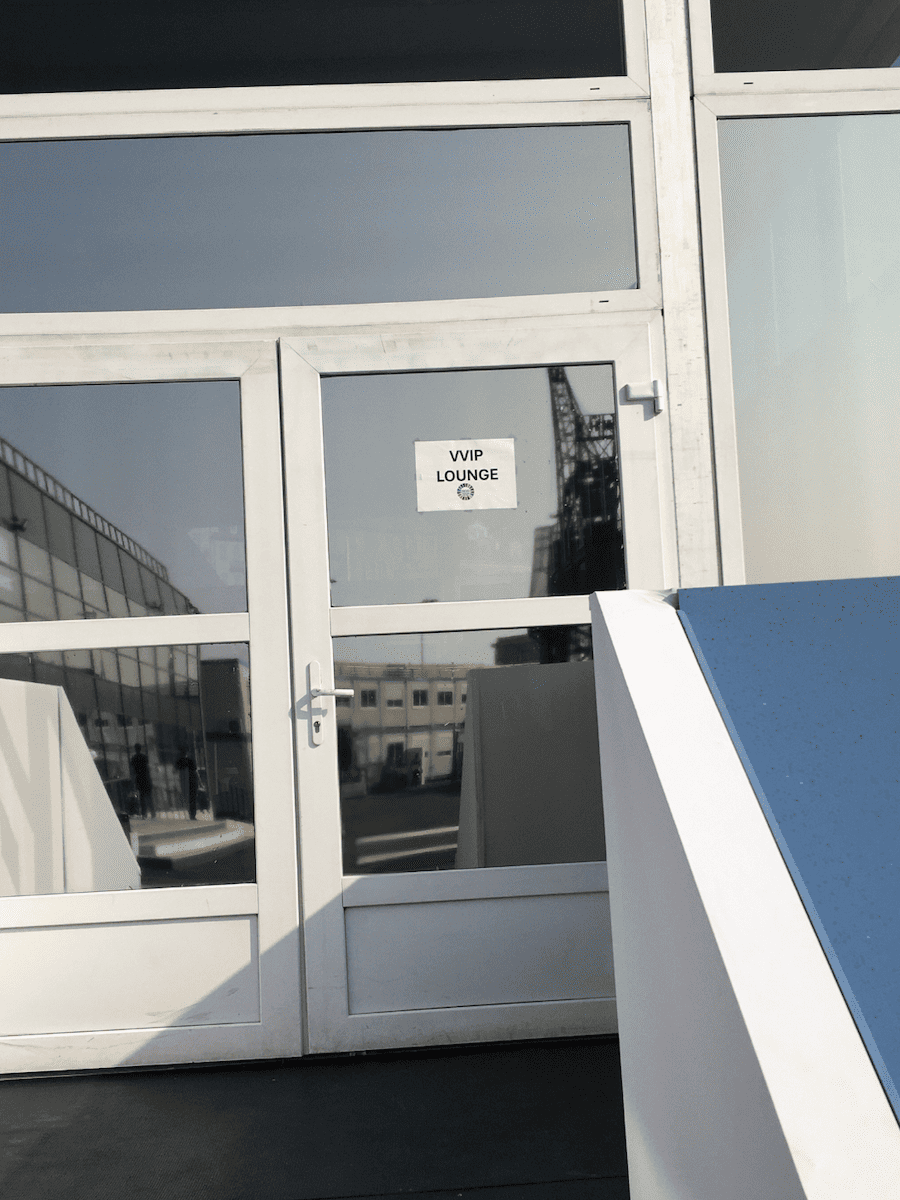Contacted in advance of the UNOC, I had an appointment with a representative of interests linked to French fisheries[1] , including industrial sectors, whose affiliate organization is an important structure in my research subject. So I contacted him a few days before the start of UNOC 3, first by email and then by SMS, to arrange a meeting. We met in the morning, in the Blue Zone, before the first diplomatic events of the day. We sit, standing, leaning against the counter of a Mediterranean cruise line. This is one of the few places in the Blue Zone where we can settle down in relative calm, in the shade before the arrival of the many national delegations and other participants. It’s still a place where people come and go from one side of the Blue Zone to the other, and our exchange is punctuated by interruptions to greet acquaintances and colleagues, or to note the passage of a minister or delegation.
In addition to questions about my personal research topics, I’m interested in the role of this actor in such an event. Why is he there? Does he have precise objectives and a pre-prepared schedule? How long does he stay? Is he alone, or with other colleagues or collaborators? These are just some of the questions that illustrate my lack of visibility of what’s at stake in the participation of the various players in such a mega-event.
This industry representative arrived on Monday and will be leaving on Friday afternoon. He explains that he was unfortunately unable to attend the scientific conferences at the One Ocean Science Congress the previous week, although he would have liked to have been present because « we’re hyper-dependent, both on the question of resources and on the environmental question, that’s the basis. »[2] But leaving for two weeks would have been too long, and he’s the only member of his organization to be on site.
He explains that he came to the UNOC without a very clear objective, as he knows that a priori « the majority of the announcements or positions that will be taken at the end [of the UNOC], are things that have already been negotiated before ». He came as an observer with a group he refers to as the « delegation of French fishing industry representatives ». This delegation has nothing official about it, like the national delegations. Rather, it’s a group of professionals from the fisheries sector who know each other and collaborate regularly in their respective activities. Its members meet in the evening to discuss the day’s events, and to « debrief » the interventions of delegations and other stakeholders. During the day, they indicate the whereabouts of this or that key figure via their WhatsApp chat, and divide up the following day‘s events to « try and dispatch each other, so that we don’t all go to the same side event ». In the end, the workings of this small collective of less than a dozen people seem comparable to those of our group of ethnographers.
A few hours after our meeting, I discovered a video of this representative on a social network, in which he expressed his delight at the fact that the « crucial » subjects linked to his sector were finally being addressed at this UN mega-event. Indeed, this is the day dedicated to fisheries issues in the blue zone: the Ocean Action Panel « Fostering sustainable fisheries management including supporting small-scale fishers » and a number of side events are devoted to the fishing sector. In this « hard-hitting » video, he denounces the positions taken by NGOs who have « taken hostage » the French public debate ahead of the UNOC, on « Franco-French » subjects such as bottom trawling and marine protected areas, which have no place at such a world summit. This video is an opportunity to reframe the debate and focus on issues that he feels are far more important than the NGOs mentioned: the fight against plastic pollution, the fight against illegal fishing, the decarbonization of the maritime sector and international fisheries management. My interlocutor shared the same observation during our morning exchange, denouncing a « polarization » of positions on French fisheries that had been amplified in the few months preceding the UNOC. The people responsible for this « crystallization of positions » were said to be certain environmental NGOs and « certain scientists […] who are more militant », who « take a hard line against industrial fishing ». During our discussion, I understand that the term « scientist » refers to researchers from the academic world who are considered too close to NGOs, which would call into question the validity of their work and scientific opinions.
Against this backdrop of what he sees as a bad press for fisheries, he explains that one of his main objectives is to « frolic » in the green zone – the area dedicated to the general public where you don’t need accreditation to enter, unlike the blue zone – in order to meet as many stakeholders as possible and « educate » them about fisheries and the issues at stake. He describes a spontaneous approach in which the aim is to meet up with long-lost acquaintances, attend side events, possibly intervene to remind people of a few facts, and renew contacts with certain NGOs who are « contacts that have perhaps been a little lost over the last few years ». The objective in the green zone seems to be to restore the image of the entire sector defended by his organization, by reaching out to as many civil society players as possible, in particular NGOs with which he has already collaborated in professional contexts (within the framework of the European Commission, for example). An undertaking that seems to me to have been made easier by my contact’s sympathetic nature and ability to listen.

In addition to his spontaneous wanderings and informal discussions with « civil society representatives », he is also the co-organizer of a side event at La Baleine – the other name for the green zone – which I attend the following day, in collaboration with representatives of the central government administration. The event brought together a wide range of players, including industry representatives from sectors other than fisheries, government representatives, producers and NGO partners. Like the UNOC’s blue zone approach, this round table developed an approach focused on « blue » technological innovation and economic and industrial development, in order to meet the environmental challenges faced by the fisheries sector: shipbuilding to modernize the fleet, developing innovation for hydrogen-powered engines, adapting port infrastructures accordingly, and so on.
At this event, my interlocutor takes his place in the audience, a few chairs away from me, in an assembly of around twenty people. The round table presents the challenges of the « energy transition in the fishing industry », the problems posed by industrial development, and the need for the State and the European Union to support innovation in the sector, and to relax certain industrial standards deemed too restrictive. Opinions are generally convergent. There was little contradictory debate, apart from a question at the end of the round table from a member of an NGO, on the transparency of the allocation of fishing quotas by producers’ organizations[3] . This distribution has an impact on the sector’s emissions, since quotas enable the resource to be harvested, and therefore the vessels to go fishing. As some fishing techniques emit less than others, influencing this distribution could be a way of reducing the sector’s carbon emissions. However, the moderator points out that the subject « falls a little outside the scope of the round table on decarbonization and energy transition in the fishing sector » and « refocuses » the debate.
The event gave the impression of a kind of « entre-soi », a gathering of players aligned on how to deal with climate change in the French fisheries sector. This was evidenced by the informal discussions and warm handshakes between panelists and members of the audience at the end of the round table, or the apostrophe of a panelist greeting a former training colleague in the audience.
The closeness between the various players in the sector, noted at this round table, is consistent with my observations on other occasions in the blue zone: handshakes at the start of side events, informal discussions in small groups before and after events, « chatter » in the audience, selfies in the audience during a panel on fisheries, grouped movements when moving from one event to another within the blue zone. In the course of my observations at the events I attended in connection with my research themes – and at which I regularly found the sector representative with whom I spoke – the faces of the participants gradually became familiar to me. As at the round table organized at La Baleine, these close personalities included representatives of the fishing industry for the most informal relations (and supposedly members of the WhatsApp group of the « delegation of representatives of the French fishing industry »), senior representatives of the French administration or members of the national delegation.
Like my interlocutor – and myself – they act as observers among the audience, taking notes on each other’s speeches and positions. As if to keep abreast of the themes and issues raised by the various speakers, and to assess the compatibility of the discourse with their own positions. At least, that’s my impression of the various panels I attended, corroborated by the existence of this WhatsApp group and their desire to gain an overview of the discourse on fisheries at this UN mega-event.
The presence of this industry representative at the UNOC therefore seems to have a dual objective: on the one hand, to consolidate a network of partners on the « civil society » side, by attempting to calm the public debate and communicating on the fisheries issues he considers to be priorities. Secondly, its presence in the blue zone enables it to keep a « watch on » speeches made during plenary sessions, Ocean Action Panels and other side events. Last but not least, this event is also an opportunity to reaffirm its visibility and proximity to stakeholders in the sector with decision-making power: other national and even international fisheries representatives, central administration officials and members of government.
– – –
[1] Note: to ensure anonymity, some details have been changed.
[2] Quotes are translated from French.
[3] Producer organizations (POs) are territorial structures made up of fishermen who are responsible for resource management. Among other things, they manage the allocation of fishing quotas among their members.

Share